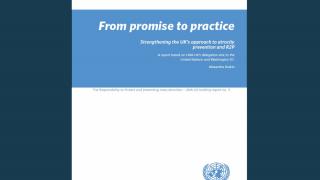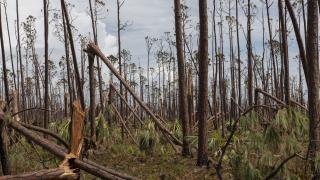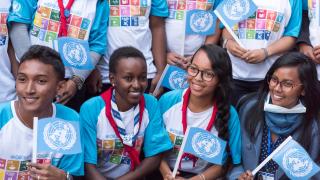UNA-UK is delighted to relase its third report on the Responsibility to Protect (R2P) and atrocity prevention. Based on the findings of a UNA-UK delegation visit to the United Nations in New York and the US Government in Washington DC,the report seeks to draw lessons from current best practice on preventing and responding to genocide, war crimes, crimes against humanity and ethnic cleansing.
Building of UNA-UK's work on R2P to date, this report first investigates the overall status of R2P at the United Nations, both within the Secretariat and amongst member states. It finds that international support for R2P has not been diminished by the intervention in Libya and that member states continue to particupate in developing the principle. In addition, there are a number of positive efforts to institutionalise prevention at the UN, driven by the Secretariat. Nevertheless, the report outlines that R2P remains an unfinished project, experiencing challenges with enforcing the norm in times of crisis, such as in Syria, and with institutionalising prevention within member states' policies.
In Washington DC, UNA-UK's delegation met with current and former members of the Atrocities Prevention Board, a body bringing together members of all major Government departments to focus on improving the US' approach to atrocity prevention. The delegation also met with prominent civil society organisations such as the US Institute of Peace and the US Holocaust Memorial Museum. The report finds that the normative and political commitment to preventing atrocities has been key to improving awareness of and activity on preventing atrocities. The Board has pushed departments to consider their understanding and response to atrocities, as well as improving coordination across Government. However, proving the effectiveness and value-added of the Board has been difficult and the Board has been reluctant to share information about its work publicly and internatonally.
The report finds that there are numerous lessons the UK could take from the UN and the US if it were interested in strengthening its approach to R2P and atrocity prevention; the fact that R2P is not a controversial principle at the UN should reassure the UK of the need to continue to strengthen the norm at the international level and within its own systems and policies and the need to articulate the place of atrocity prevention in UK national interests and set out how this interest will be protected and achieved by relevant departments.
The report recommends that the UK acknoweldge that the prevention of atrocities are in the UK's national interest in the next National Security Strategy and set out how this will be protected and mainstreamed into existing policy on preventing conflict, buidling stability and countering extremism in the Strategic Defence and Security Review. It also suggests ways in which the UK could strengthen its own mechanisms and policies, including through defining the role of the National Security Council in preventing atrocities and improving existing early warning frameworks.







